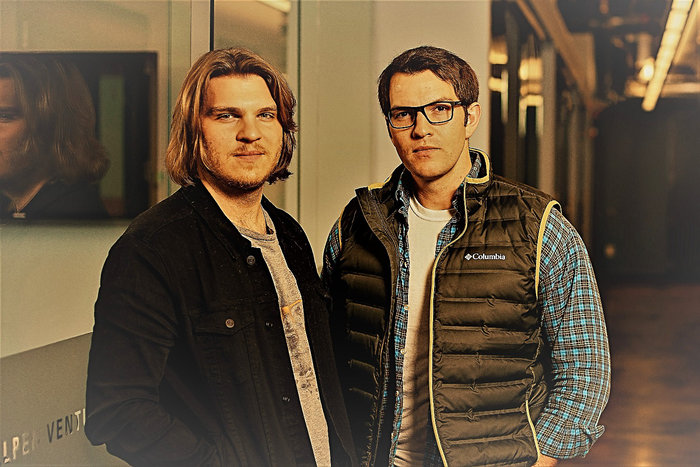Goldman Sachs estimates that the creator economy is currently worth $250 billion.
It is slated to double to nearly $480 billion by 2027.
In short, creators are in high demand.
And even athletes are getting in on the action.
But, building a “creator business” can be overwhelming and disorganized with data and information all over different platforms.
This is where RootNote comes in.
Designed specifically for sports and entertainment content creators, they’re developing the first comprehensive platform to help athletes, creators, media companies, and the teams, organizations, and brands they work with leverage their data to grow their businesses.
Fresh off of closing a $1.5M round – co-founders (and brothers) Jason and Jeremy Burchard alongside CTO Chandler Barnes are lighting the creator economy on fire.
In this interview with Jeremy Burchard, we discuss how they came up with the idea for RootNote, what the creator economy will look like in the next few years, and advice for founders looking for co-founders.
Hello, who are you and what is the name of your company?
I’m Jeremy Burchard, co-founder and Chief Creative Officer of RootNote.
I’m one of three founders alongside my brother, CEO Jason, and CTO Chandler Barnes. I’m personally a lifelong content creator and bring my experience as a working creator to the table.
RootNote is a SaaS company serving creative teams and content creators in the sports, entertainment, and media landscape.
We’re developing the first comprehensive platform to help athletes, creators, media companies, and the teams, organizations, and brands they work with leverage their data to grow their business.
RootNote supports ingesting data from digital content, social media, e-commerce, and other third-party platforms to understand digital audiences better, increase transparency, and maximize revenue opportunities.
Early users of the platform include NFL teams, MiLB teams, talent agencies, media and Esports companies, universities, brand name creators, and NIL groups.
Jason and I earned our initial experience in the music industry. Our first company together invested in and worked with creators for equity, much like a startup and very unlike the (in my opinion antiquated and predatory) model for financing creators now.
While doing that, we uncovered a larger problem affecting many people, from athletes and teams to organizations and universities to influencers and entertainers.
We believe every business is a content creator and every content creator is a business, but creators and the companies that work with them have been underserved when it comes to data tools to help them run their businesses.
That’s why RootNote exists.
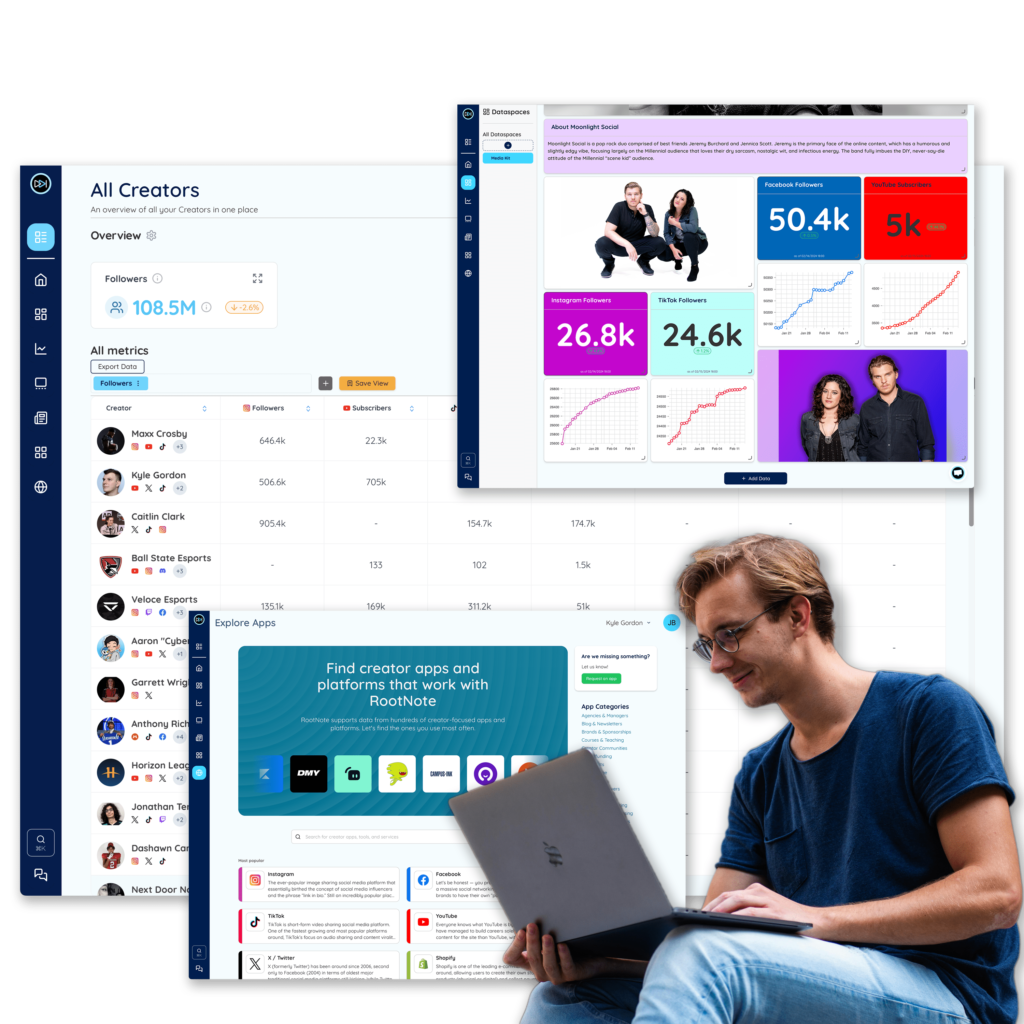
What was the process of getting the company off the ground?
In some ways, it was a really long process, and in others, things have moved quickly.
Uncovering the problem and opportunity was iterative, and it included a lot of things like Excel spreadsheets (which, to Jason’s credit, were some of the prettiest Excel spreadsheets I’ve ever seen).
We initially worked with a friend who helped us build a prototype of a prototype of sorts.
Even though it was early, we got a lot of buy-in from people who worked with different content creators. We had early users and paying customers, which was obviously a bonus. But we also had a fairly limited product.
Eventually, we needed to find a true technical co-founder, and that’s when Chandler came on board. From there it was a lot of problem-solving and breaking while continually thinking about the bigger picture.
Jason talked with different companies, organizations, teams, and managers while I approached the problem from the vantage point of a creator. Chandler continued to think through potential pitfalls as we started to consider the use case for RootNote working with larger and larger teams.
It wasn’t until we got to Techstars that we grasped just how many people and what types of companies RootNote is for, from universities working with thousands of student-athletes to even other startup companies using digital content as part of their brand.
The product has developed rapidly in the past 6 months or so as we’ve been able to quadruple our engineering bandwidth.
How is the company doing now and what is the long-term vision?
Right now, we’re very motivated and energized.
We’re oversubscribed on our pre-seed round and expanded the team in critical areas. We just opened up the product from a sort of “private beta” to the wider public, which means we’re taking on more clients, doing more free trials, and interfacing with new customers more and more.
We have some aggressive growth goals, but we think they’re achievable. We’re still working specifically with B2B clients and our sales are founder-led.
We pride ourselves on interfacing with all of these clients because that feedback is invaluable. We ultimately aim to open up RootNote to individual creators monthly too, though. We strongly believe all creators deserve tools to help them leverage their data.
One thing we’ve done well that a lot of startups our age and size haven’t done is create a robust organic content strategy.
Am I biased because I create 99% of the content? I’ll let you decide!
But the truth is, we have a really strong organic search reach. We rank for thousands of keywords and drive anywhere from 2,500 to 4,000 unique visitors per month right now entirely off our content.
We haven’t spent any money on advertising since this raise, and while we certainly look forward to the days of having a healthy enough budget to do that, right now we’re sitting in a much better position thanks to still being able to reach people organically.
We’re still a very small team. It’s the three founders, three additional engineers, our operations lead, a part-time designer, and a few part-time associates.
Coupled with the fact we aren’t spending on advertising right now, that means our monthly overhead is low and lean. We’d like to get to break even or profitability by the next time we want to go out and raise.
Our long-term vision is to be a critical component of any sports, media, and entertainment business, big or small, similar to how they need CRM or accounting software.
You can check out a public link to a RootNote Dataspace we’ve built to track our own company here.
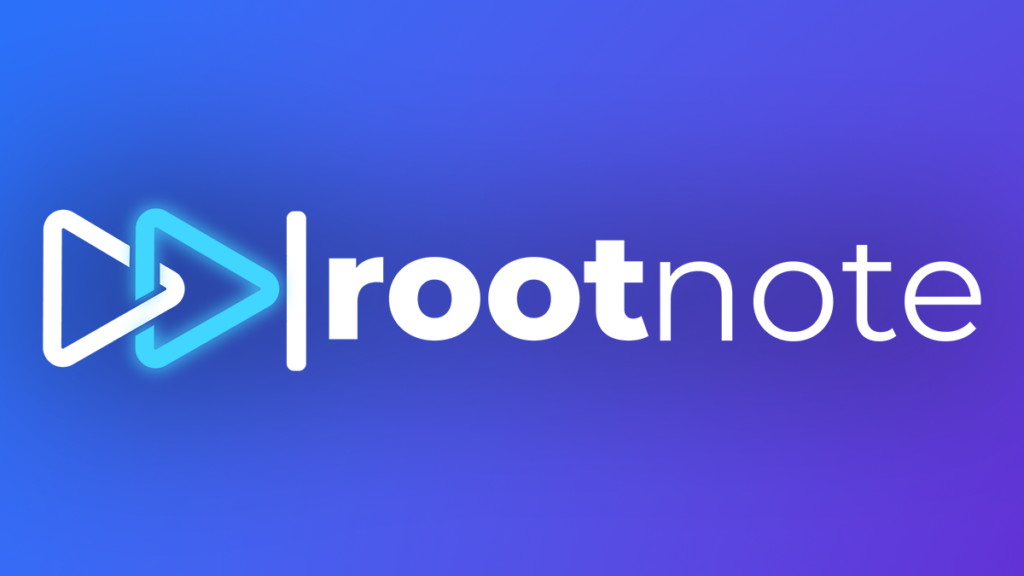
Through starting the business have you learned anything particularly helpful or advantageous?
Oh yeah, a ton! And I’m sure all founders probably get all sorts of advice from all over the place.
Some of it is motivationally saccharine and some of it is legitimately helpful. But that’s one big lesson — feedback whiplash. You’re going to get a lot of feedback and plenty of it will contradict other feedback.
You’ve got to have your wits about you and both appreciate the time and energy it takes for somebody to give you feedback and also give yourself the grace to ignore everybody else’s opinion if you truly believe in something. (Don’t ignore your customers though…mostly).
One piece of advice we heard from a successful founder in Techstars that stuck with me is, “You’ve got to be in love with the problem, not with your product.”
I think that’s such an applicable concept to not just your product, but your business as a whole, and even your personal life.
If your north star is creating solutions for a problem and helping the people, you’re going to be more willing to make the changes you need to build a successful company than if you merely think you have a “cool idea” that you’re unwilling to waver on because it’s your idea.
What advice do you have for founders looking to raise capital?
I was very happily a sideline player when it came to all the dirty work in our recent raise (though I routinely joked that I was the “closer” when it came time for investors to speak with the whole team).
So I’ve got some advice for you straight from my brother Jason, the CEO and madman who traveled coast to coast to meet with people and make it happen:
Start building relationships before you ever need to raise money. Other founders in your city who’ve raised money from angel investors and VCs are the best place to start.
They’ll be able to share more about their experience and help you decide if raising money is the right path for you to go down in the first place. They’ll also be able to provide the non-PR version of how they raised the money.
Just remember, we’re all incredibly busy, so do your homework and come prepared with questions.
If you do decide that raising capital from outside partners is the right way to fund your company, other founders will be able to give the best insight into what it’s like working with investors on their cap table and what they’re looking for.
It will be especially helpful if you can talk to a founder who recently raised from the groups you’re interested in.
Capital markets change constantly and putting traction in perspective is critical to properly positioning yourself for a raise. Also, remember that different partners and different funds invest in different themes.
Finally, a warm introduction to an investor from a founder who has them on their cap table is generally the best intro you can get.
Intros from investors who already invested in your round are great too. If you’re convinced that a specific fund or angel could be a good fit, ask them and they’ll generally offer to send a “forwardable” on your behalf if they think it could be.
What are some predictions you have for the creator economy over the next few years?
I think more and more people who don’t consider themselves “creators” will enter the space.
We’re already seeing a lot of industries that you wouldn’t consider ripe for content creation have a ton of success on platforms like Instagram and TikTok by creating compelling video content.
Honestly, even a lot of athletes are just now embracing this paradigm shift. Just because you don’t think of yourself as a “creator” first doesn’t mean you aren’t part of the creator economy.
I also think the creator economy will start to encompass a more diverse group of people, especially when it comes to age. We look at how quickly college and high school athletes have started taking advantage of new NIL rules.
These are people who grew up with a phone in their hand and are learning about their digital brand long before most people otherwise would.
But on the other side of the coin, this notion that content creation is “just for kids” or even “just for social media” is really dwindling.
You don’t even need to be on social media to develop a strong brand and career as a content creator, thanks to platforms that enable memberships and training more easily than ever.
I do think we’ll see a decline in new platforms that essentially try to create new monetization avenues for creators and then monetize by taking a percentage of that.
There was a surge in this model during and immediately after COVID, but I just don’t think the appetite is there among creators when there are already some very credible and established platforms.
But overall, we’re (obviously) incredibly bullish on the creator economy’s continued growth.
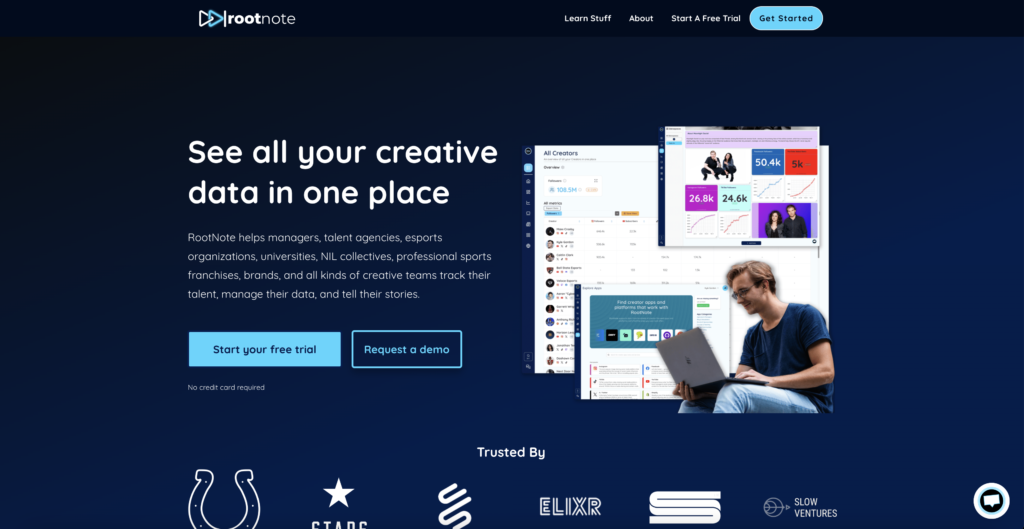
What was going through the Techstars accelerator like and would you recommend other founders to go through an accelerator as well?
Techstars was an amazing experience for us.
There’s something really powerful about being around other entrepreneurs and having access to all these resources and mentors. Of course, there was plenty of stress to go along with it — it’s a masterclass in time management, that’s for sure — but as a team, we all appreciate the opportunity to learn and grow, so it was right up our alley. A
lso physically being in Indianapolis for as much as possible was critical for us. Although Techstars does a great job of accommodating hybrid participation, there is no substitute for being there, you know?
If the choice is binary, then I’d say yes, everybody should try for an accelerator. But certainly, not all accelerators are created equally, even within the same ecosystems.
For us, the timing and balance were perfect. Accelerators require buy-in from founders to be as present and committed as possible.
If your team can commit to the process, you will exit the accelerator a much stronger company. And just being practical here, I can’t say whether or not our $1.5 million pre-seed round would’ve happened without Techstars, but it certainly happened faster and more confidently because of it.
Who are some of the people you admire and look up to in the sports industry and why?
Of course, we’re impressed with the athletes who do an amazing job building a brand away from their sport. But you don’t have to be Michael Jordan, Maria Sharapova, or David Beckham to build brands that grow long beyond your playing career.
Personally, I resonate most with the athletes who are out there juggling all of their different obligations, building their brands, and still doing everything they need to be good at their sport. I feel that on a personal level as a content creator.
I also have immense respect for a lot of the student-athletes who are navigating the NIL world, especially in some of the “smaller” schools or sports.
We’ve had conversations with college athletes like Jack Betts and Vaughn Seelicke who are forging new paths in the NIL world and absolutely crushing it, even though they’re not names you see on your TV screen every weekend.
That said, I also know how much work goes into making sure everything is a smooth operation and, arguably most importantly, an awesome experience for fans.
The front office and game day operations teams are really unsung heroes in the success of any collegiate or professional franchise.
A lot of people think success in sports revolves around the players and coaches a team can attract, but I’d argue it all comes down to fan experience.
Oh, and I’d be remiss if I didn’t mention our fellow entrepreneurs out there building new companies to help improve the industry for all involved.
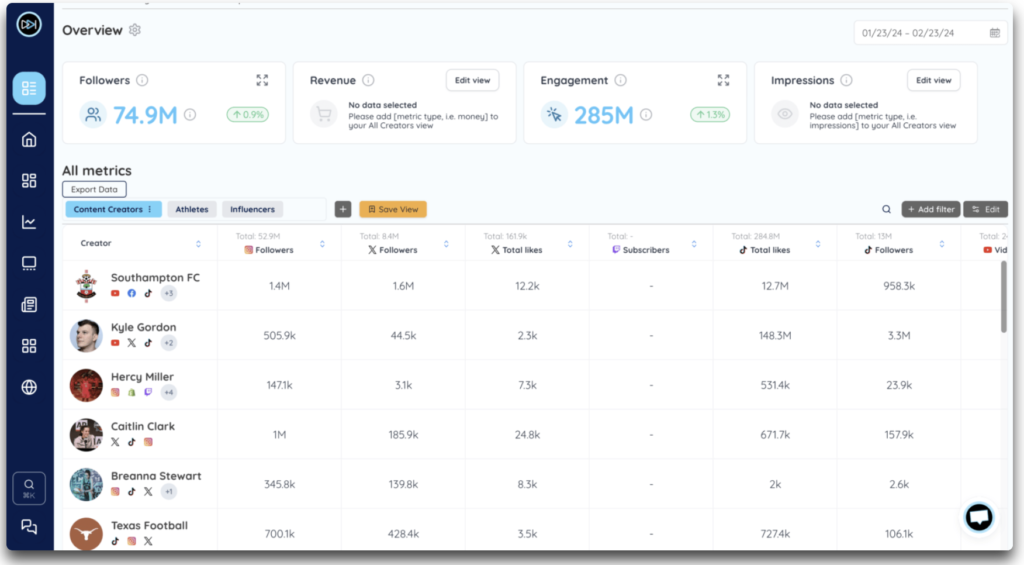
What advice do you have for founders looking to find a co-founder and/or build a team?
It’s funny because, on the one hand, I’ve known my co-founder my entire life.
So I was kind of dealt a winning hand in the co-founder department (though I know not everybody is as fortunate to have a great relationship with their siblings as I am).
But I can definitely provide some perspective from when it came time for us to find a CTO and technical co-founder.
It was honestly a lot like dating, but because we already had a network of other founders and mentors, we got to skip the “dating app” portion and go straight to the “my friend has this friend you should meet” portion.
And that’s pretty much exactly how it happened. A mutual mentor and colleague made an introduction between us. We had dinner and several subsequent conversations before all agreeing it felt like the right fit.
But I think the real lesson there is you need to be open and transparent with your network. We let people know quite publicly that we were looking. Chandler was vocal to his network about seeking a change from his position before RootNote. If you don’t let people know who or what you’re looking for, they won’t be able to help.
We also very much try to be in a “give first” mindset, meaning we try to be as helpful to our network as possible — partially because it gives us the warm fuzzies, but also partially because we’ve seen time and again how being a helpful resource to others always comes back to you when you need it most.
The biggest thing when it comes to co-founders is, in my experience, unrelenting honesty. Our team works well together because we’re all honest with each other, good at different things, and we don’t try to do each other’s job. We certainly work to hold each other accountable, but we all have different personalities and skill sets. Jason and I are quite different in a lot of ways. He’s an extrovert and I’m an introvert.
He’s a problem solver and a networker, and I’m a creative and a tinkerer. Despite being brothers, we have quite different backgrounds in our adult lives. The same can be said of Chandler. And that all leads to what we believe is a well-rounded team.
So long story short, be honest with yourself and your network and embrace differences. Your company will be stronger for it.
Are you currently hiring and if so, where can people apply and find out more?
While we’ve filled all of our open roles, we’re always happy to chat with interested candidates.
You can reach us at careers@rootnote.co.

